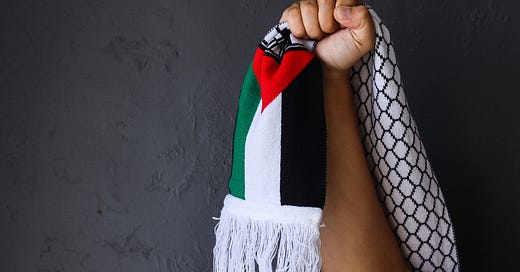The Hidden Cost of Performative Compassion
A Palestinian's perspective on virtue signaling and the activist shadow
I am Palestinian, but I don't feel obliged to talk about Palestine, and neither should you. The moment we transform human suffering into social obligation, we corrupt both the message and the messenger.
Consider what happens when tragedy strikes anywhere in the world. Within hours, social media transforms into a parade of positioned empathy, where the currency of moral worth is measured in shared posts and public declarations. Those who remain silent find themselves under the microscope of collective judgment, their silence interpreted as complicity.
But this performative pressure reveals more about those demanding the performance than the cause they claim to champion. Behind every accusation of silence lurks an unacknowledged shadow - the virtue signaler's own inner void, desperately seeking validation through displays of moral superiority.
The psychology runs deeper than mere social positioning. When we demand others mirror our outrage, we're often seeking to validate our own emotional response, to confirm that our anger or grief is justified. The activist archetype, noble in its authentic form, becomes distorted into something darker - a compulsion to control how others process and express their relationship to tragedy.
What's rarely acknowledged is the impossible standard this creates. Every moment, somewhere in the world, profound suffering unfolds. If we truly believed in the obligation to publicly perform our compassion for every worthy cause, we would drown in an ocean of perpetual outrage. The human psyche isn't designed to maintain constant emotional vigilance over every global tragedy.
Yet this obvious truth gets buried under layers of social coercion. The same people who pressure others to speak out about one crisis are often conspicuously silent about countless others. This selective outrage isn't just hypocrisy - it's a telling sign of how political movements hijack genuine human suffering, transforming it into a weapon of social control.
The victim narrative becomes particularly toxic in this context. Those who claim to speak for the oppressed often engage in their own form of oppression, using guilt and shame as tools to enforce compliance with their preferred expression of solidarity. The irony of fighting perceived oppression with emotional coercion seems lost on them.
Perhaps most destructively, this dynamic corrodes the authenticity of genuine concern. When compassion becomes mandatory, it ceases to be compassion at all. True empathy can't be compelled any more than true love can be forced. The moment we begin policing others' emotional responses, we transform something sacred into something performative.
There's also a profound arrogance in demanding certainty about complex global conflicts. The reality is that most situations involve immense layers of historical, cultural, and political complexity that resist simple narrative frameworks. Yet the social pressure to take absolute positions leaves no room for nuance or uncertainty.
The path forward isn't through enforced displays of solidarity but through reclaiming our right to process world events authentically. This means acknowledging that compassion without performance is still compassion, that silence doesn't equal complicity, and that genuine engagement with global issues requires more than social media activism.
True virtue doesn't announce itself. It doesn't demand recognition or require others to mirror its expression. It exists independently of social validation or political positioning. The real revolution begins when we stop performing our values and start embodying them - when we recognize that authentic engagement with the world's pain requires neither a megaphone nor an audience. In this quiet authenticity lies the seed of genuine change.
Joel Rafidi
P.S If you are feeling the call to immerse yourself in an incredibly intentional 10 weeks of personal transformation in an intimate online container, then we are running our highly acclaimed group coaching program for the twelfth and final time starting March 4th. Enrollments are now open with only 10 total spots available. Learn more here.





Great article Thanks Joel,
James Alison wrote in ‘Forgiving Victim’ that, “… our self-identity as ‘good’ is one of our most sacred idols.” I can know myself as good only when I know others in some ways as bad. The comparison is necessary to reveal, to emphasize the meaning of real or imagined differences. I know I’m worshipping the idol of a good self-identity when I hear myself piously intoning liturgies blaming ‘them’ as the cause of my problems.
As Jung wrote,
Everywhere in the West, there are subversive minorities who, sheltered by our humanitarianism and our sense of justice, hold the incendiary torches ready, with nothing to stop the spread of their ideas except the critical reason of a single, fairly intelligent, mentally stable stratum of the population.
The mass crushes out the insight and reflection that are still possible with the individual, and this necessarily leads to doctrinaire and authoritarian tyranny if ever the constitutional State should succumb to a fit of weakness.
Written so well. Resonating and Deeply appreciated. Thank you for sharing.